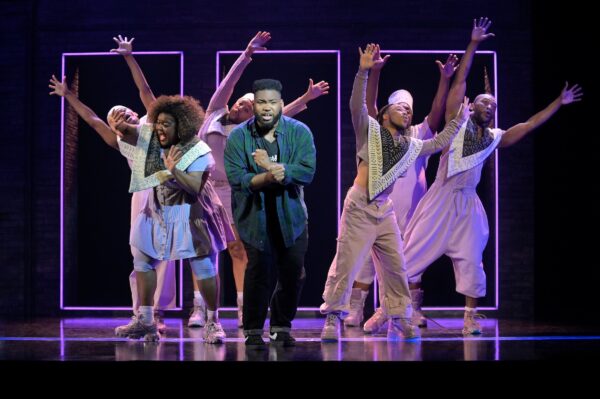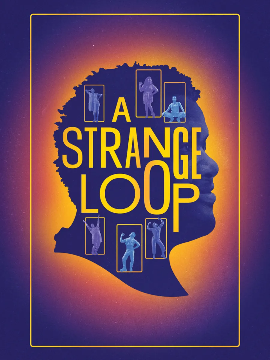A STRANGE LOOP’S IDENTITY CRISIS
See if you can guess which musical this is.
“A young black man sets out on a spiritual journey to discover his art, love, and himself. Along the way, he encounters a wild assortment of characters who, by way of contrast and tribulation, guide him along his path. This quest is anchored to his troubled relationship with his god-fearing mother. The show deals with the black experience, spirituality, sexuality, family, art, and self-discovery. Oh, and it’s a meta-theatrical, self-referential piece in which the main character is actually the writer of the show.”
Did you guess A Strange Loop? You are correct! Did you guess Passing Strange? You are also correct!
J. Cameron Barnett (Thought 2), Jordan Barbour (Thought 5), Avionce Hoyles (Thought 3), Malachi McCaskill (Usher), Tarra Conner Jones (Thought 1), John-Andrew Morrison (Thought 4), and Jamari Johnson Williams (Thought 6)
A Strange Loop first debuted Off-Broadway in 2019, won a Tony and Pulitzer when it hit Broadway in 2022, and is hitting regional theatres and overseas in production after production. Now in a co-production with SF’s American Conservatory Theater, A Strange Loop opened at the Ahmanson Theatre last night to a full house of enthusiastic theatregoers, several of whom had seen this show multiple times. Musical theatre audiences are traditionally quite gay, but there was a notable uptick in gender fluidity and glittering fabulosity throughout this crowd ’” and it’s no wonder given the timely celebration of queerness that A Strange Loop embodies.
Malachi McCaskill (Usher) with Tarra Conner Jones (Thought 1), Jordan Barbour (Thought 5), John-Andrew Morrison (Thought 4), Avionce Hoyles (Thought 3), J. Cameron Barnett (Thought 2), and Jamari Johnson Williams (Thought 6)
How many audience members, I wonder, are familiar with the 2008 Tony Award- and Drama Desk Award-winning musical Passing Strange? Those who are will not be able to deny the similarities (including the word “strange” in the title). In a nutshell: A Strange Loop, though unquestionably entertaining and well-crafted, is ultimately a watered-down, misguided knock off of Passing Strange. Everything A Strange Loop does, Passing Strange does better.
Helmed by the show’s Broadway creative team — including director Stephen Brackett and choreographer Raja Feather Kelly — this acclaimed piece centers on Usher (Malachi McCaskill), a theatre usher who is “travel[ing] the world in a fat, black, queer body” and struggling to establish himself as a musical theatre writer. He’s plagued by his own incarnated Thoughts, played by the six other cast members (Jordan Barbour, J. Cameron Barnett, Carlis Shane Clark, Avionce Hoyles, Tarra Conner Jones, and John-Andrew Morrison). The Thoughts embody his inner critics, his family, industry gatekeepers, sex partners, historical black figures (including a gun-toting Harriet Tubman), and a gospel choir singing about AIDS. It’s an inventive rollercoaster of a script. And, impressively, McCaskill effortlessly holds court in this quick-paced, 100-minute one-act, barely leaving the stage for more than a few minutes.
 Malachi McCaskill and the cast of A Strange Loop
Malachi McCaskill and the cast of A Strange LoopDon’t get me wrong. If you decide to see A Strange Loop, you will absolutely enjoy yourself (assuming you’re not averse to a smorgasbord of ripe blackness and unfettered gayness). It’s got razor-sharp wit, riotous humor, honest writing, masterful performances, rollicking music, and exquisite production design. But the story is a bit meandering, the music fun but forgettable. And though it does a pretty good job of resisting didacticism and moralizing amid a sea of polarizing subject matter, it couldn’t resist indulging in a moment of browbeating as the protagonist delivers his (lackluster) version of the America Ferrera Barbie monologue.
Avionce Hoyles (Thought 3), Jordan Barbour (Thought 5), J. Cameron Barnett (Thought 2), Tarra Conner Jones (Thought 1), John-Andrew Morrison (Thought 4), and Jamari Johnson Williams (Thought 6)
Every actor on stage is a standout — there’s not a weak link in the bunch. Under Sean Kana‘s music direction, the vocals are impeccable all around. The dynamism of the performances is off-the-charts. Arnulfo Maldonado’s set is superbly restrained with a richly satisfying payoff at the end. You will certainly cackle with delight, and you may even find yourself moved and misty-eyed. I applaud everyone involved with this particular production. They knocked it out of the park. It is well worth the ticket price and the trip to Downtown L.A.
J. Cameron Barnett (Thought 2), Tarra Conner Jones (Thought 1), Jamari Johnson Williams (Thought 6), John-Andrew Morrison (Thought 4), Malachi McCaskill (Usher), Jordan Barbour (Thought 5), and Avionce Hoyles (Thought 3)
Here’s the problem: A Strange Loop never achieves what it purports to achieve. You don’t drop a name like Douglas Hofstadter, open the door to existentialism, and then not follow through. This piece confronts identity politics head on, and it does so quite brilliantly for three quarters of the script. It’s an overdue conversation and bookwriter, composer and lyricist Michael R. Jackson is the perfect person to lead us through it. But in the final moment, at the threshold to a brilliant revelation that could help tilt our sociopolitical landscape back toward substance and sanity ’¦ he falters. He doesn’t know how to bring it into the end zone. He’s the dog that caught the car. Instead of completing its strange loop, the show spins its wheels, stuck in the same place it started — unsure how to escape the trap of vapid identity and feeling sorry for itself.
Malachi McCaskill and the cast of A Strange Loop
This is why Passing Strange is a perfect benchmark. This lesser-known piece written by Stew over a decade earlier is a shining example of how to actually surmount such a prodigious theme, and to do it with humor, wit, artistry, and heart. Passing Strange actually arrives at its destination, and it’s one of the most profound and moving moments in all of musical theatre history. Because the journey and resolution are so meta and philosophical, they’re easy to miss or under-appreciate if you don’t know what to look for. Jackson’s piece couches itself in the same narrative echelon but doesn’t quite measure up. What’s ironic is the people who actually notice and appreciate Loop’s attempt to transcend identity politics and answer a philosophical riddle (arguably the minority) will be disappointed, and the people who don’t catch or care about that current (arguably the majority) will think this is the greatest musical of its time. So, A Strange Loop succeeds by failing.
Jordan Barbour (Thought 5) and Malachi McCaskill (Usher)
This musical was poised to be an updated iteration of Stew’s underrated masterpiece, but it didn’t pay off. That’s likely because Stew actually completed his spiritual journey before (or while) writing his piece, so he had a star by which to guide himself. Jackson seems to still be finding his way, as evidenced in his program message and in the show’s final song. A Strange Loop is a musical that only makes sense in its time and therefore will probably not age well. It befits its title and delivers on entertainment, but it does not fulfill its promise of enlightenment. In the near future, perhaps we’ll see another work from this talented writer in which the suppressions and superimpositions of Loop and his subsequent works White Girl in Danger and Teeth have successfully been overcome. How? By not reifying and glorifying identity.
photos by Alessandra Mello
A Strange Loop
Center Theatre Group
a co-production with SF’s American Conservatory Theater
Ahmanson Theatre, 135 N. Grand Ave. in Los Angeles
ends on June 30, 2024
for tickets (starting at $35), visit CTG


{ 3 comments… read them below or add one }
My god! What a well-written incisive review. I saw Passing Strange on Broadway and totally missed the connection.
I am really impressed. Christopher Lloyd Bratten’s writing/analysis reminds me of Scott Miller, a St Louis based director who has written many wonderful books about musical theatre.
The first thing I thought of when I heard about A Strange Loop was Passing Strange. And I couldn’t disagree with you more regarding the comparison to that work, which I find much more conventional and, quite frankly, mediocre.
I find your criticism of the ending of A Strange Loop to be odd. You write “Instead of completing its strange loop, the show spins its wheels, stuck in the same place it started…” Well yes, that is exactly the point of the piece. It makes me wonder if you really understand exactly what a “strange loop” is, since by definition it is never complete, always ending in the place it started. It is seeing life not as a story told in narrative form, but life as an Escher drawing, where one constantly feels they are advancing, only to somehow end up at the beginning. Over and over. It’s the same major theme of Waiting for Godot–with kick-ass production numbers!
Given the way we are currently seeing in real time how our society is moving backward in regards to personal rights and acceptance of the “other,” with the right-wing literally making the same tired, worn arguments in support of their goal of straight, white superiority, I’d say Strange Loop will be (sadly) relevant for a very long time.
I admit that this idea of stasis as the norm might be difficult to accept, especially in a theatrical sense, where people tend to believe there must be a journey of change in the character(s). But I think it’s also closer to how reality plays out.
Don — Thank you! I teach Passing Strange in one of my courses, so I was primed to notice the similarities.
Danno — I appreciate your thoughts. You may be right about the show’s relevance in the coming decades. Time will tell. We might disagree on a couple of fundamentals. I think true stasis is unachievable, in art and in reality. Change is one of the universal constants; and I think that partly explains why it’s become conventional to imbue story with meaningful change from beginning to end. It’s also the reason that striving for stasis in art is a doomed mission. I’m not sure I think that’s what Strange Loop was after, though.
To your other point regarding my line about the show spinning its wheels, I admit the metaphor was precariously vague at best, especially given the nature of this show. Here’s a brief clarification. I agree that A Strange Loop does complete a loop. But it’s not a strange one, certainly not in the Douglas Hofstadter sense. To achieve that, the character would have needed to simultaneously return to the beginning and be significantly changed (one would assume for the better, but it could’ve been a tragedy, too). What I’m reacting to is less the failure (as I perceive it) and more the missed opportunity for something truly transformational. I happen to think Passing Strange does this. (And here I’m mainly referring to the story; the other elements — music, lyrics, etc. — are largely beside the point.) I will acknowledge, though, that Passing Strange chose a comparatively easier target. A Strange Loop chose a quite difficult one. It would be like trying to write a musical about Derridean deconstruction. You’re practically doomed the minute you start writing. At the end of the day, I’m not saying you’re wrong. I just think we view the show differently, which is the nature of art and humanity.